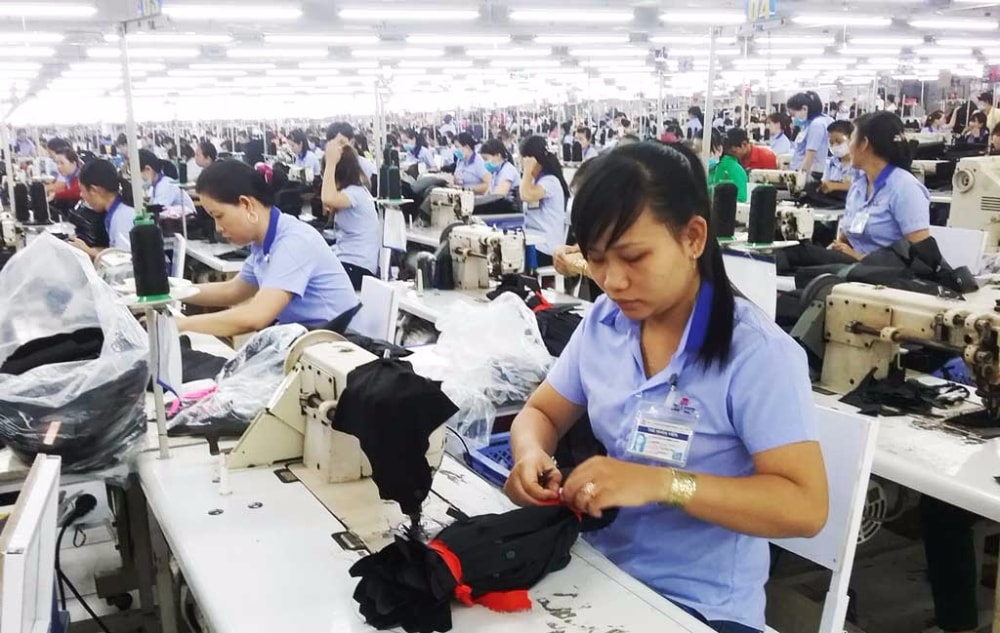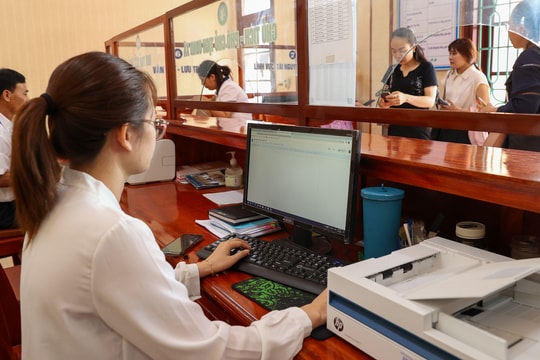Receive one-time social insurance benefits - Accept the trade-off?
Most workers see receiving one-time subsidies as a way to solve immediate difficulties, forgetting about long-term benefits.
Vietnam Social Security said that currently, the number of employees receiving one-time social insurance benefits is on the rise. In the first five months of 2018, nearly 300,000 employees nationwide received one-time benefits from Vietnam Social Security. According to statistics, in recent years, on average, about 700,000 people have completed social insurance procedures to receive one-time benefits each year.
Accept the trade-off?
According to a survey by the Institute of Workers (CN) Trade Unions (Vietnam General Confederation of Labor), the majority of workers who quit their jobs and receive one-time social insurance benefits are between the ages of 35 and 40, mainly working in labor-intensive enterprises such as textiles, footwear, and seafood. Explaining this phenomenon, Mr. Le Dinh Quang, Deputy Head of the Labor Relations Department of Vietnam General Confederation of Labor, said that most older workers, with declining health and low productivity, are afraid of being eliminated by their employers, so quitting their jobs to receive one-time social insurance benefits is the only option.
 |
| Workers will have difficulty receiving a lump sum benefit when they retire. |
Contacting us, Mr. Nguyen Van Le, HR director of a company specializing in processing leather shoes for export in Binh Duong province, said that recently, many employees who have been with the enterprise for 15 to under 19 years have continuously submitted applications to resign to receive one-time social insurance.
"The company has no policy of firing older workers, so the HR department tried to persuade them to withdraw their decision, as this would affect their long-term future, but they still did not change their minds. Receiving a large amount of subsidy but not knowing how to use it, their future will certainly be uncertain," Mr. Le worried.
Regarding the reason for her resignation, Ms. Tran Thi Kim Dam - from Tien Giang, a worker at a company in Cu Chi district, Ho Chi Minh City - said that she started working at the company in 1998, 20 years ago. At the age of 40, she felt she was no longer healthy enough to continue working as a worker. Ms. Dam said:"I want to quit my job early so that in addition to unemployment insurance and severance pay, I can also receive social insurance at a time. Collecting all the benefits will also give me some capital to do business." We asked if she was worried about the future when she gets old and has no pension, Ms. Dam smiled and said: "Wherever it is, don't think too far ahead."
For the same reason, despite having worked for nearly 19 years, employee Ho Thi Tot (from Long An) who is working at a company in Binh Duong, also decided to quit her job to receive a one-time social insurance benefit. "Because of my old age, I cannot keep up with the younger employees, my productivity is very low, and sooner or later I will lose my job. By submitting my resignation, I will have a decent amount of money to return to my hometown to do business?" - Ms. Tot explained.
Uncertainty about the future is a common mentality of older workers, so quitting their jobs to receive a one-time social insurance benefit is only a temporary solution. Losing their jobs at an old age, their chances of returning to the labor market are certainly very low.
The future is uncertain
According to the 2014 Social Insurance Law, in addition to the provisions on pension benefits, employees can receive a one-time social insurance benefit. However, if they do not consider carefully before deciding to receive a one-time social insurance benefit or pension, employees will be disadvantaged.
According to labor experts, employees themselves need to think carefully when deciding to receive one-time social insurance, because if they receive one-time social insurance, they will also lose the opportunity to receive a pension, there will be no guarantee for life in old age, and it will become a burden for the family and society.
According to lawyer Dang Anh Duc (Dang and Associates Law Firm - Hanoi Bar Association), employees need to understand that the amount of money paid into the Social Insurance Fund is their own valuable savings, it is not lost but on the contrary, it is still managed and invested for growth by the Social Insurance agency, employees can completely reserve the time to pay Social Insurance so that when conditions permit, they can continue to participate in compulsory Social Insurance or participate in voluntary Social Insurance with partial financial support from the state.
"During the retention period, if unfortunately passing away, the employee will also receive a funeral allowance equal to 10 months of basic salary. Relatives, depending on the conditions, will receive a monthly death allowance (maximum 4 people) until adulthood (if they are children) or until death (if they are wives, husbands or parents who have passed working age and have no income or have income but lower than the basic salary); in case of receiving a one-time death allowance, the allowance level will be calculated as a one-time social insurance allowance. With the above benefits, employees must consider carefully to ensure their future" - lawyer Duc advised.
Agreeing with this opinion, Mr. Nguyen Van Khai, Permanent Vice President of the Ho Chi Minh City Labor Federation, analyzed: "If receiving social insurance one time, employees will suffer a great loss. With the rate of 22% of monthly salary contributed to the pension and death fund, the total contribution in one year is 2.64 months' salary, while the one-time social insurance benefit for each year of social insurance contribution is only equal to 2 months' salary. Thus, employees lose 0.64 months' salary.
Short-term gain, long-term loss
One of the reasons why employees want to receive a one-time social insurance benefit is that the conditions are too simple, specifically, only need to quit work for one year without continuing to participate to receive benefits. Furthermore, the minimum condition of social insurance payment time to receive pension is quite long (20 years), which has discouraged a number of employees.
"To limit this situation, trade unions at all levels must focus on propaganda and explaining to employees the harmful effects of receiving one-time social insurance benefits, and not suffer long-term losses because of short-term benefits. In addition, the Social Insurance Law also needs to study shortening the conditions on minimum social insurance payment period to receive pensions, increase the level of state support for voluntary social insurance participants... so that employees can see the practical benefits of accumulating social insurance payment time to receive pensions" - Mr. Le Dinh Quang suggested.




